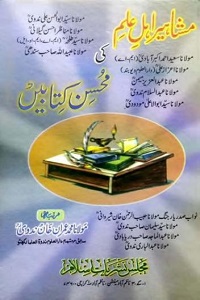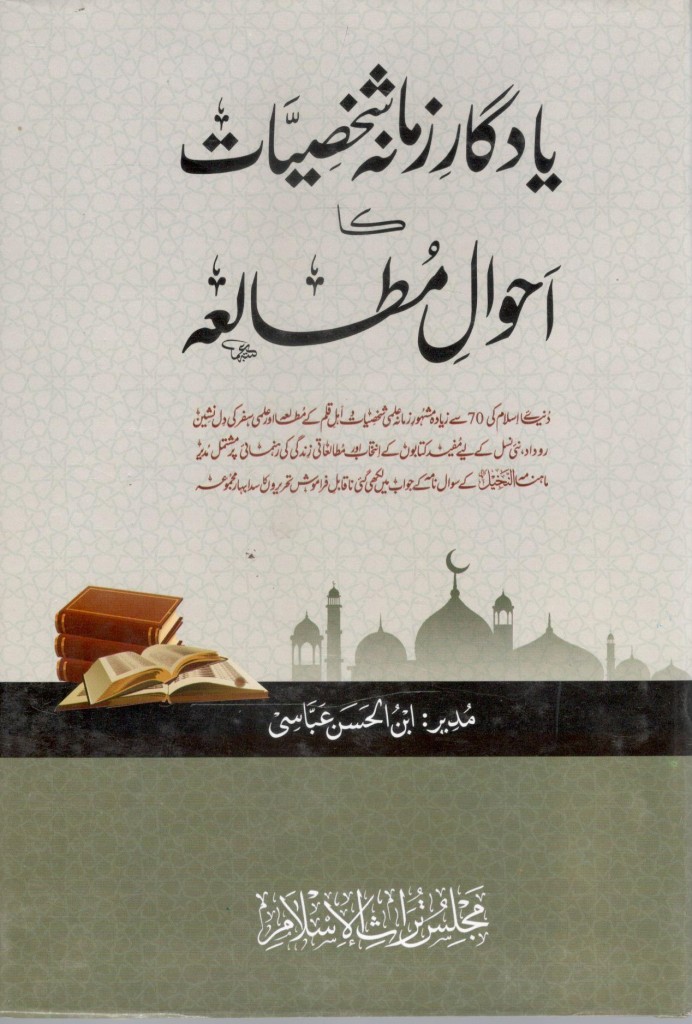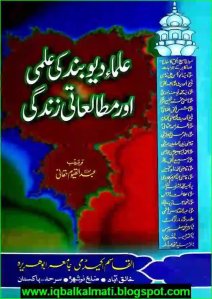بعض طلباء کے استفسار پر کہ ہر مضمون سے متعلق ایسی کتب جو سہل اور جامع ہوں ان کی نشاندہی کر دی جائے، تو ایسا ایک مجموعہ پیش خدمت ہے۔ کتابوں کی ترتیب آسان سے مشکل کی جانب ہے۔ اس مجموعہ کی ترتیب میں درس نظامی کے طلباء کی رعایت کی گئی ہے، مگر دوسروں کیلئے بھی نفع سے خالی نہیں ہے ۔
السياسة الإسلامية
اسلام اور سیاسی نظریات از مفتی تقی عثمانی
حکیم الامت کے سیاسی افکار از مفتی تقی عثمانی
اسلامی مملکت اور حکومت کے بنیادی اصول از محمد اسد (مترجم مولانا غلام رسول مہر) انگریزی ایڈیشن
بین الاقوامی تعلقات – اسلامی اور بین الاقوامی قانون کا تقابلی مطالعہ از ڈاکٹر وہبہ الزحیلی مترجم مولانا حکیم اللہ (العلاقات الدولیۃ فی الاسلام)
الأحكام السلطانية از علامة ماوردي (450ه) (اردو ترجمہ از مولوی سید محمد ابراھیم) (انگریزی ترجمة از ڈاکٹر اسد اللہ)
اسلامی معاشیات
اسلام اور جدید معیشت و تجارت از مفتی تقی عثمانی
اسلام کا نظام تقسیم دولت از مفتی محمد شفیع عثمانی (1976)
یورپ کے تین معاشی نظام از مفتی رفیع عثمانی (2022)
سرمایہ دارانہ اشتراکی نظام کا اسلامی معاشی نظام سے موازنہ از حضرت علامہ شمس الحق افغانی (1983)
اسلامی معاشیات از مولانا مناظر احسن گیلانی (1956)
تاریخ
تاریخ ملت از مفتی زین العابدین و مفتی انتظام اللہ شہابی
آب کوثر، رود کوثر، موج کوثر از شیخ اکرام (1973)
تاریخ دعوت وعزیمت از مولانا ابو الحسن علی ندوی (1999)
مقدمہ از علامہ ابن خلدون (808ھ) (اردو ترجمہ از مولانا راغب رحمانی، انگریزی ترجمہ از فرانز روزنتھال (2003)، تلخیص مقدمہ از مولانا محمد حنیف ندوی)
الإعلان بالتوبيخ لمن ذم أهل التوريخ از علامہ سخاوی
سیرت
سیرۃ المصطفیٰ از مولانا ادریس کاندھلوی (1974)
اسوہ رسول اکرم از ڈاکٹر عبد الحی عارفی (1986)
زاد المعاد از علامہ ابن القیم (751ھ) (اردو ترجمہ از علامہ رئیس احمد جعفری جلد اول جلد ثانی)
السیرۃ النبویۃ از مولانا ابو الحسن علی ندوی (1999)
السیرۃ النبویہ از ابن ہشام (اردو ترجمہ از مولانا قطب الدین احمد محمودی جلد اول جلد ثانی جلد ثالث)
تصوف
تصوف کیا ہے از مولانا منظور نعمانی (1997) و دیگر
الاربعین از امام غزالی (404ھ 1111) (اردو ترجمہ تبلیغ دین از مولانا عاشق الٰہی میرٹھی)
تزکیہ و احسان از مولانا ابو الحسن علی ندوی (1999)
آثار الاحسان از علامہ ڈاکٹر خالد محمود (2020) (جلد اول جلد دوم)
مقالات احسانی از مولانا مناظر احسن گیلانی (1956)
التکشف عن مہمات التصوف از مولانا اشرف علی تھانوی (1943)
عقائد
اسلامی عقائد از مفتی عبد الواحد
عقائد اسلام از مولانا ادریس کاندھلوی (1974)
عقیدہ طحاویۃ از علامہ طحاوی (اردو شرح از مولانا الیاس گھمن)
الفقہ الاکبر از امام ابو حنیفہ رحمہ اللہ (عربی شرح از ملا علی القاری) (اردو شرح از مولانا الیاس گھمن)
العقيدة الحسنة از شاہ ولی اللہ (اردو ترجمہ عقائد الاسلام از مفتی محمد خلیل خان القادری)
فرقِ اسلامیۃ
تاريخ مذاهب الاسلامية از شیخ ابو زھرہ مصری (1394ھ) (اردو ترجمہ)
الفَرق بين الفِرَق وبيان الفرقة الناجية منهم از عبد القاہر بغدادی (429ھ)
مقالات الإسلاميين واختلاف المصلين جلد اول جلد ثانی از ابو الحسن الاشعری (330ھ)
الملل والنحل از علامہ شہرستانی (548ھ)
تقابل ادیان
تقابل ادیان از مولانا محمد یوسف خان
اظہار الحق از مولانا رحمت اللہ کیرانوی (اردو ترجمہ بائبل سے قرآن تک از مفتی تقی عثمانی)
الفِصل فی الملل والاھواء والنحل از امام ابن حزم (اردو ترجمہ)
هداية الحياريٰ في اجوبة اليهود والنصارى از ابن قیم (751ھ)
الردود والتعقبات
اختلاف امت اور صراط مستقیم از مولانا یوسف لدھیانوی (2000)
حضرت معاویہ رضی اللہ عنہ اور تاریخی حقائق از مفتی تقی عثمانی
اشرف الجواب از مولانا اشرف علی تھانوی (1943)
تسکین الصدور فی تحقیق احوال الموتی فی البرزخ والقبور از مولانا سرفراز خان صفدر (2009)
عبارات اکابر از مولانا سرفراز خان صفدر (2009)
تحفہ اثنا عشریہ از شاہ عبد العزیز (اردو ترجمہ از مولانا خلیل احمد نعمانی مظاہری)
رد الالحاد
الانتباھات المفیدہ عن الاشتباہات الجدیدہ از مولانا اشرف علی تھانوی (1943) (تسہیل و شرح اسلام اور عقلیات از مولانا محمد مصطفیٰ خان بجنوری)
معرکہ ایمان و مادیت از مولانا ابو الحسن علی ندوی (1999)
الدین القیم از مولانا سید مناظر احسن گیلانی (1956)
مذہب اور سائنس از علامہ وحید الدین خان (2021)
مذہب اور جدید چیلنج از علامہ وحید الدین خان (2021)
علاماتِ قیامت
علاماتِ قیامت از مولانا عاشق الٰہی بلند شہری (2002)
التصریح بما تواتر فی نزولِ المسیح از علامہ انور شاہ کشمیری (1933) (اردو ترجمہ از مفتی محمد رفیع عثمانی (2022))
الخلیفۃ المہدی فی الاحادیث الصحیحۃ از مولانا حسین احمد مدنی (1957)
عقیدہ ظہور مہدی احادیث کی روشنی میں از مفتی نظام الدین شامزئی (2004)
دفاع السنة والحديث
فتنہ انکار حدیث از مولانا ایوب دہلوی (1969)
شوق حدیث از مولانا سرفراز خان صفدر (2009)
صرف ایک اسلام بجواب دو اسلام از مولانا سرفراز خان صفدر (2009)
حجیت حدیث از مولانا ادریس کاندھلوی (1974)
متونِ حدیث پر جدید ذہن کے اشکالات از پروفیسر اکرم ورک
آپ بیتیاں
آپ بیتی از مولانا عبد الماجد دریابادی (1977)
احاطہ دیوبند میں بیتے ہوئے دن از مولانا سید مناظر احسن گیلانی (1956)
آپ بیتی از مولانا زکریا کاندھلوی (1982) (جلد اول، جلد ثانی)
نقش حیات از مولانا حسین احمد مدنی (1957)
المنقذ من الضلال از امام غزالی (404ھ 1111) (اردو ترجمہ اجالوں کا سفر از علامہ عبد الرسول ارشد)
سوانح
تذکرۃ الرشید از مولانا عاشق الٰہی میرٹھی
سوانح قاسمی (1,2,3) از مولانا مناظر احسن گیلانی (1956)
اشرف السوانح از خواجہ عزیز الحسن مجذوب
تذکرہ شاہ ولی اللہ از مولانا مناظر احسن گیلانی (1956)
نقش دوام، حیات محدث کشمیری از مولانا انظر شاہ مسعودی (2008)
یادِ رفتگاں
یادِ رفتگاں از مولانا سید سلیمان ندوی
پرانے چراغ از مولانا ابو الحسن علی ندوی (1999)
شخصیات و تاثرات از مولانا یوسف لدھیانوی (2009)
نقوشِ رفتگاں از مفتی تقی عثمانی
مجموعہ مکاتیب
بلاغِ مبین یعنی مکاتیب سید المرسلین ﷺ از مولانا حفظ الرحمن سیوہاروی (1962)
مکتوباتِ شیخ الاسلام از مولانا حسین احمد مدنی (1957)
مکتوباتِ امامِ ربانی از مجدد الف ثانی (اردو ترجمہ از مولانا سید زوار حسین شاہ، البینات شرح مکتوبات از شیخ سعید احمد مجددی)
غبارِ خاطر از مولانا ابو الکلام آزاد (1958)
شاہ ولی اللہ دہلوی کے سیاسی مکتوبات جامع سید خلیق نظامی
علوم القرآن
علوم القرآن از مفتی تقی عثمانی
علوم القرآن از علامہ شمس الحق افغانی
آثار التنزیل از علامہ ڈاکٹر خالد محمود جلد اول، جلد ثانی
التبیان فی علوم القرآن از شیخ محمد علی الصابونی (اردو ترجمہ از علامہ محمد صدیق ہزاروی)
مقدمہ فی اصول التفسیر از امام ابن تیمیہ (اردو ترجمہ از مولانا عبد الرزاق ملیح آبادی)
الاتقان فی علوم القرآن از علامہ سیوطی (اردو ترجمہ از مولانا محمد حلیم انصاری جلد 1، جلد 2)
غريب القرآن
لغات القرآن از علامہ ڈاکٹر خالد محمود (2020)
لغات القرآن از مولانا عبد الکریم پاریکھ (2007)
لغات القرآن از مولانا عبد الرشید نعمانی
مفردات الفاظ القرآن از امام راغب الاصفہانی (اردو ترجمہ مفردات القرآن از مولانا محمد عبداللہ فیروزپوری)
تفاسیر القرآن
معارف القرآن از مفتی شفیع عثمانی
تفسیر عثمانی از علامہ شبیر احمد عثمانی
بیان القرآن از مولانا اشرف علی تھانوی
احکام القرآن از امام ابوبکر جصاص رازی (اردو ترجمہ از مولانا عبد القیوم)
تفسیر القرآن العظیم از امام ابن کثیر
مشکلات القرآن
آیات متعارضہ اور ان کا حل از مولانا محمد انور صاحب گنگوہی
مشکلات القرآن از مولانا انور شاہ کشمیری
دفع ایھام الاضطراب عن آیات القرآن از شیخ محمد الامین شنقیطی
تأويل مشكل القرآن از امام ابن قتیبہ
مسائل الرازي وأجوبتها من غرائب آي التنزيل از محمد بن أبي بكر بن عبد القادر الرازي
مشکلات الحدیث
شرح معانی الآثار از امام طحاوی
شرح مشکل الآثار از امام طحاوی
تأویل مختلف الحدیث از ابن قتیبہ
مختلف الحدیث از امام شافعی
مشکل الحدیث و بيانه از امام ابوبکر بن فورک (406ھ)
اصول الحدیث
نزهة النظر في شرح نخبة الفكر از علامہ ابن حجر عسقلانی (852ھ 1449) (عمدۃ النظر اردو شرح نزهة النظر از مفتی محمد طفیل)
تدریب الراوی فی شرح النواوی از علامہ سیوطی
قواعد فی علوم الحدیث از مولانا ظفر احمد تھانوی
الرفع والتکمیل فی الجرح والتعدیل از مولانا عبد الحی لکھنوی
دراسات في علوم الحديث على منهج الحنفية از عبد المجید الترکمانی



